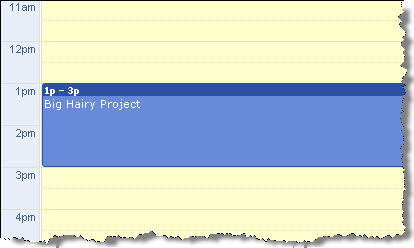 Is it OK to block your calendar to work on something, even if it doesn’t have a concrete deadline? GTD’er Michael asked about the best ways to find time for the time-demanding projects that are important, but don’t have a deadline. One of our executive coaches replied with some helpful tips.
Is it OK to block your calendar to work on something, even if it doesn’t have a concrete deadline? GTD’er Michael asked about the best ways to find time for the time-demanding projects that are important, but don’t have a deadline. One of our executive coaches replied with some helpful tips.
I have been using the Getting Things Done system for about two years now and with terrific success. The ability to free my mind of all the commitments I’ve made and things I need to do has not only helped me function more effectively, but also been a tremendous relief! As a part-time MBA student with a full-time job, I’ve been able to balance many different projects at once as a result of the GTD system. Friends, family and coworkers often remark about how impressed they are with my ability to keep up with it all — GTD is my secret weapon!
Despite my success with the system so far, I’m always looking for ways to become more productive. One of things that I struggle with the most is balancing “tasks” with “priorities.” I often find myself quickly checking off the little, inconsequential “to do’s,” but not always finding time for the more important, time-demanding projects.
I realize that the premise of GTD is to only put things on your calendar that have to be done at a specific time or on a specific date, and that items without a concrete deadline go on the next action list. With work and school and family and friends, I find very little free time to get to the non-time-sensitive, but pretty time-intensive projects. I’m very tempted to block off the time it will take to complete them on my calendar, but there’s a part of me that feels like this goes against everything GTD stands for.
Any advice would be appreciated.
Regards,
Michael
Coach Janet Riley replied:
It is so great to hear how successfully you are using GTD to enable you to keep up with all that you have on your plate. Good for you!
As a GTD presenter, trainer and coach, I often find that folks who’ve been faithfully implementing GTD and following best practices believe, as you do, that nothing can ever go on the calendar that isn’t a time-specific or day-specific action (meaning it has to be done at a specific time on a specific day such as a meeting with someone, a doctor’s appointment, or scheduled conference call). It is true that we emphasize that it is not productive to create lengthy “to-do” lists you expect to accomplish on a specific day and then keep moving that list from day to day when unexpected priorities and tasks arise.
However, there are circumstances where blocking time on your calendar to focus on a significant and important larger task is appropriate and not in conflict with GTD best practices. For example, when I coach new or even experienced GTD users about doing a weekly review, I often suggest they block the time on their calendar for that review in order to find the “chunk” of time needed to get the review completed with as few interruptions as possible and with thoroughness as required. But they are choosing that time and working alone during that weekly review period. Otherwise, people often find that they would go thorugh an entire week and never have a 1 to 1 1/2 hour block of time unexpectedly clear for doing that review.
In the same way, I often recommend that if you have a task that requires a “chunk” of significant time to complete or make progress on–such as 2 hours to write an article or report, 2 hours to draft a budget or 90 minutes to create a project plan, it can be a best practice to block the time for that work on your calendar. For many people, finding a full two-hour block of time to work on one project or task is as impossible as expecting to have a two-hour meeting with someone without you both scheduling it–that kind of open time in your calendar may be highly unlikely to show up without some planning.
The most important guide is that you honor that blocked time. In other words, treat it as if someone was showing up for a two-hour meeting that you’ve scheduled with them. Make that appointment with yourself equally as important as that appointment with others would be, and be sure you use it to get the work done you intend. The caution I often suggest is not to block time to work on larger tasks and then constantly ignore those blocks or become numb to them by using them in other ways. Be judicious and thoughtful when you follow this behavior. In addition, be consistent about reviewing your calendar both backward and forward at least a couple of weeks when you do your GTD review. That is key to ensuring that if you do have something on your calendar that gets overrided or cancelled by an unexpected even higher priority or emergency, you will be conscious to reschedule time for that missed work either on your calendar or ensure it’s still on your next-action list.
Janet


A very good question from Micahel and very good points and advice from Janet. It makes good sense to block a certain amount of time to get some time intensive work done.
I have through long time been keen on getting work done from my list and have been somewhat stuck between:
*the advice from GTD on not to making To-do-lists day-to-day and instead working off my lists and making sure all of my extracurricular and personal projects are moving forward.
*the advice from my student counselor to schedule my calendar with both classes and time to do some self-studying and homework e.g. Monday: 08-10.30 prepare for class, 10.30-13.30 classes, 13.30-15.00 post-class work and review, 15.00-15.30 commuting,15.30-17.00 nothing, 17.00-18.30 prepare and eat dinner, 18.30-19 scan the text for the next day, 19.00-? nothing.
How do you guys balance blocked-time and “open-slots”, what is your approach or what is your opinion on this dilemma?
I think that the student schedule (or freelancer’s schedule) is a bit of a different beast. For the 9-5er, there are at least somewhat defined blocks of time in which to get work done: basically, when you’re at work and not eating lunch or at a meeting.
But a freelancer or student, while they do have meetings and/or classes, these tend to be more spread out and it sometimes feels like the whole day can be the workday. This can lead to the feeling that either there is no downtime, or there is all the time in the world (neither is good for productivity).
As a grad student myself, I was thrilled to find the Study Hacks blog and the Getting Things Done for College Students system in particular:
http://calnewport.com/blog/?p=15
I’m trying it out for the first time this fall; so far I already feel much more on top of things than I did last semester. We’ll see if the rest of the semester bears it out.
Interesting article with plenty of very good advices!
Being productive is one of the biggest problem of all around the world people. It’s true. we don’t have anymore the gold rush but we really have a bigger problem now : productivity rush.
Day by day, at work, at school, at home, we have to do the tasks/things better and faster. Where we’re gonna get in the end ?
Very good advice! I’ve tried this with very mixed success and recently realised another key factor in making this successful. I work in an open plan office, with interruptions common (typically at least once in every 10 minutes). This can completely shatter all your planning when booking out time to work for 2 hours on one thing.
I’ve met some success in countering this by actually booking a meeting room or going to a quiet study area to do the 2 hour effort. You may have some success by setting the expectations of colleagues, but that did not work for me. An alternate location was what turned it around in my case.
Great discussion here. From my point of view this is OK as long as the Spirit of the Calendar is respected– what is on the calendar is sacrosanct, and is the “hard landscape” for the day.
So do not DARE put a block of time on your calendar if you won’t use it. That could be the beginning of a slide into all kinds of craziness and anxiety.